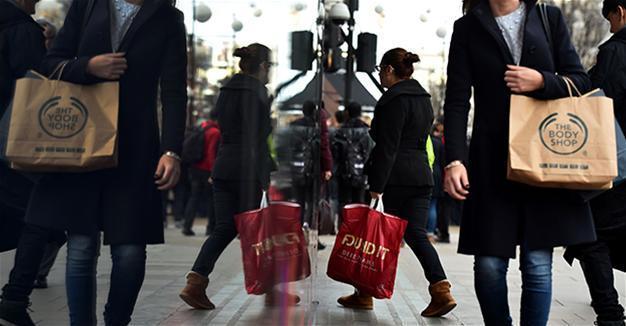UK consumers suffer longest decline in spending power since 1970s
LONDON-Reuters
 British consumers have suffered the longest decline in their spending power since the 1970s, official data showed on June 30, although there was a sign that the economy may have recently gathered a bit of momentum.
British consumers have suffered the longest decline in their spending power since the 1970s, official data showed on June 30, although there was a sign that the economy may have recently gathered a bit of momentum.The figures from the Office for National Statistics painted a bleak picture for consumers who are facing the double hit of rising inflation - caused in large part by the fall in the pound since the Brexit vote - and slowing wage growth.
Household disposable income, adjusted for inflation, fell for the third quarter in a row, the ONS said, putting some of the blame on the timing of tax payments.
That was the worst run since the 1970s and took the household savings ratio down to an all-time low of 1.7 percent.
The Bank of England is watching for signs of a pickup in the economy after the weak start to the year as it plans when to raise interest rates for the first time in a decade.
The ONS confirmed that the economy grew by just 0.2 percent in the January-March period compared with the previous three months, slowing sharply from the fourth quarter of 2016 when it grew by a quarterly 0.7 percent.
The sudden slowdown meant Britain went from being one of the fastest-growing economies among the Group of Seven rich nations to its weakest performer in the first quarter.
The BoE expects growth to increase speed to 0.4 percent in the second quarter - despite the inconclusive outcome of this month’s national election - and has said it might start to raise interest rates if it sees stronger exports and investment in the coming months.
The ONS said Britain’s giant services sector grew by a monthly 0.2 percent in April, slightly slower than in March. But growth was up 0.2 percent in the three months to April, faster than 0.1 percent in the first three months of the year.
Alan Clarke, an economist with Scotiabank, said earlier on Friday that monthly growth of 0.2 percent for the services industry in April would be consistent with the BoE’s forecast for overall economic growth to pick up in the second quarter to 0.4 percent.
ONS said business investment grew by a quarterly 0.6 percent in the first three months of 2017, unchanged from its previous estimate and only partially offsetting a fall in the fourth quarter.
It also said Britain’s current account deficit widened to 16.9 billion pounds in the January-March period, equivalent to 3.4 percent of gross domestic product, up from 2.4 percent in the fourth quarter.
The increase in the shortfall was driven mostly by a weak performance in Britain’s trade balance in early 2017 although it was slightly smaller than a median forecast of 17.3 billion pounds in a Reuters poll of economists.
BoE Governor Mark Carney has said the current account deficit represents one of the vulnerabilities of Britain’s economy, leaving it dependent “on the kindness of strangers” to keep funding its shortfall.
Breaking down the overall growth of the economy in early 2017, the ONS said household spending grew more slowly than in late 2016, up 0.4 percent compared with 0.7 percent in the fourth quarter.
Real household disposable income fell by 1.4 percent in quarterly terms, the third fall in a row and the biggest drop since the first quarter of 2013.
















